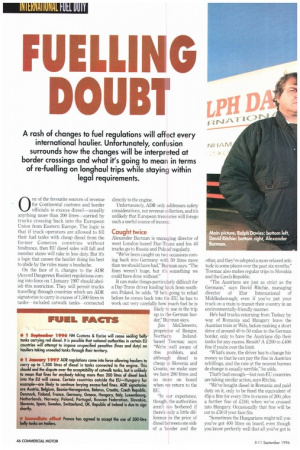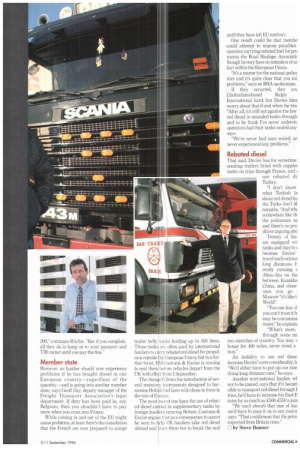FUELLING DOUBT
Page 48

Page 49

If you've noticed an error in this article please click here to report it so we can fix it.
0 ne of the favourite sources of revenue for Continental customs and border officials is excess diesel—usually anything more than 200 litres—carried by trucks crossing back into the European Union from Eastern Europe. The logic is that if truck operators are allowed to fill their fuel tanks with cheap diesel from the former Comecon countries without hindrance, then EU diesel sales will fall and member states will rake in less duty. But it's a logic that causes the haulier doing his best to abide by the rules many a headache.
On the face of it, changes to the ADR (Accord Dangereux Routier) regulations coming into force on 1 January 1997 should abolish this restriction. They will permit trucks travelling through countries which are ADR signatories to carry in excess of 1,500 litres in tanks—included catwalk tanks—connected directly to the engine.
Unfortunately, ADR only addresses safety considerations, not revenue collection, and it's unlikely that European treasuries will forego such a useful source of income.
Caught twice
Alexander Burman is managing director of west London-based Dar-Trans and his 40 trucks go to Russia and Poland regularly.
"We've been caught on two occasions coming back into Germany with 50 litres more than we should have had," Burman says. "The fines weren't huge, but it's something we could have done without."
It can make things particularly difficult for a Dar-Trans driver loading hack from southern Poland, he adds. "If he's going to refuel before he comes back into the EU, he has to work out very carefully how much fuel he is likely to use in the trip up to the German border." Burman says. Jim McClements, proprietor of Bangor, Northern Ireland. based Towmac says: "We're well aware of this problem, and although diesel is cheap in Slovenia and Croatia, we make sure we have 200 litres and ao more on board when we return to the EU.
"In our experience, though, the authorities aren't too bothered if there's only a little difference in the price of besel between one side if a border and the
other, and they've adopted a more relaxed attitude in some places over the past six months." Towmac also makes regular trips to Slovakia and the Czech Republic.
"The Austrians are just as strict as the Germans," says David Ritchie, managing director of Elar International of Middlesborough; even if you've put your truck on a train to transit their country in an environmentally-friendly manner.
He's had trucks returning from Turkey by way of Romania and Hungary leave the Austrian train at Wels, before making a short drive of around 40 to 50 miles to the German border, only to have the Austrians dip their tanks for any excess. Result? A £200 to £400 fine if you're over the limit.
"What's more, the driver has to change his money so that he can pay the fine in Austrian schillings, and the rate at the nearest bureau de change is usually terrible," he adds.
That's bad enough—but non-EU countries are taking similar action, says Ritchie, "We've bought diesel in Romania and paid duty on it, only to be fined the equivalent of 45p a litre for every litre in excess of 200, plus a further fine of £100, when we've crossed into Hungary Occasionally that fine will be cut to £50 if your face fits.
"Sometimes the Hungarians might tell you you've got 400 litres on board, even though you know perfectly well that all you've got is 200," continues Ritchie. "But if you complain, all they do is hang on to your passport and TIR carnet until you pay the fine."
Member state
However, no haulier should now experience problems if he has bought diesel in one European country—regardless of the quantity—and is going into another member state, says Geoff Day, deputy manager of the Freight Transport Association's legal department. If duty has been paid in, say, Belgium, then you shouldn't have to pay more when you cross into France.
While coming in and out of the EU might cause problems, at least there's the consolation that the French are now prepared to accept
trailer belly tanks holding up to 500 litres. Those tank l are often used by international hauliers to carry rebated red diesel for propulsion outside the European Union; but in a further twist, FIM Customs & Excise is ceasing to seal them l before vehicles depart from the UK with eff t from 1 September.
The change follows the introduction of several statutov instruments designed to harmonise Briti h fuel laws with those in force in the rest of Europe.
The mos-reicent one bans the use of rebated diesel ca 'ed in supplementary tanks by foreign haullers entering Britain. Customs & Excise argues that as a consequence it cannot be seen to help UK hauliers take red diesel abroad and trust them not to break the seal
until they have left EU territory.
One result could be that rnembe could attempt to impose penalties operator carrying rebated fuel for pro warns the Road Haulage Associati( though he may have no intention of u; fuel within the European Union.
"It's a matter for the national police ities and it's quite clear that you (III problems," says an RHA spokesman.
If they occurred, they cot.
Cheltenham-based Ralph International hard; but Davies him worry about that if and when the tim "After all, it's still not against the law red diesel in unsealed tanks through and to be frank I've never understc operators had their tanks sealed any says.
"We've never had ours sealed, an never experienced any problems."
Rebated diesel
That said, Davies has for sometime sending trailers fitted with supple! tanks on trips through France, and I use rebated di Turkey.
"I don't know what Turkish la about red diesel bu the Turks don't lil remarks. "And wh( somewhere like th the policeman sa and there's no poi driver arguing abo Twenty of his
are equipped wi tanks and they're t because Davies' travel such extraoi long distances. Irently running c Alma-Ata on the between Kazakhs China, and obser once you go Moscow "it's like t: World".
"You can buy d you can't trust it b may be contamina water," he explaini "What's more, through some ref ren stretches of country. You may r house for 400 miles, never mind a tion.'' An inability to use red diese increase Davies' costs considerably, h "We'd either have to put up our rate doing long distance runs," he says.
Another international haulier, wt not to be named, says that if it becam sible to transport red diesel through I tries, he'd have to increase his East E rates by as much as £500-£550 a joui
"We can't absorb that size of inci we'd have to pass it on to our custor says. "That could mean that the price exported from Britain rises."
El by Steve Banner
















































































































